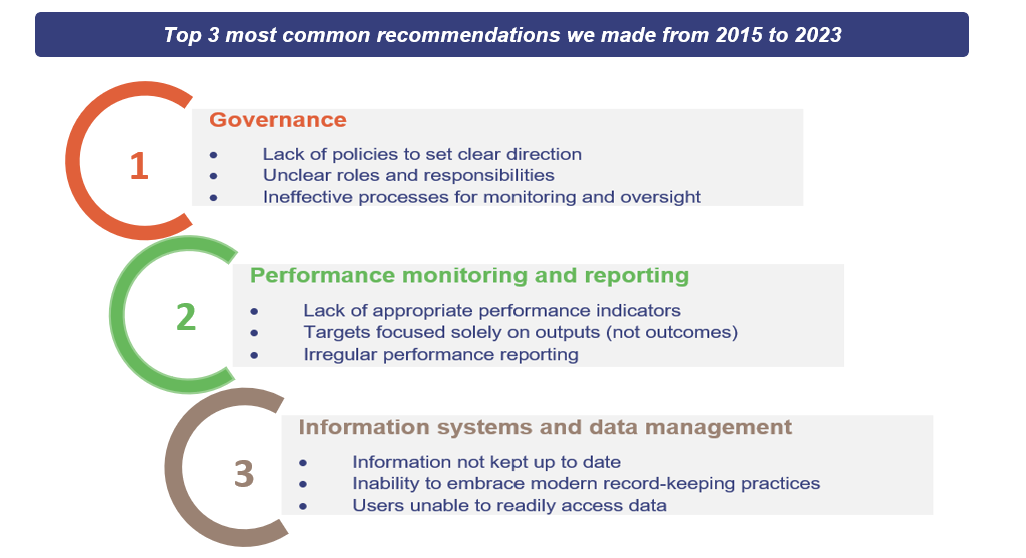Our performance audits are carefully planned to focus on the topics that matter to the Queensland community, and to help public sector entities to deliver better public services.
The Queensland Audit Office has an important role to play in assessing the performance of entities which deliver essential services, such as hospitals, schools, and roads. We also provide independent assurance that public money is being used well to deliver these services.
We tailor our recommendations so they are client-focused and address the root cause of issues, helping entities improve their processes and systems. When implemented, our recommendations can provide significant value.
We consult with entities when developing our recommendations to confirm whether they agree with them. While we cannot make entities implement our recommendations, we track and report on their progress each year in our Status of Auditor-General’s recommendations report. In this report we also highlight improvement opportunities and common challenges entities face and this process can help us identify areas for a follow-up audit or future audit topics.
What are the most common recommendations we make?
We group our recommendations into 10 categories* based on key components of effective management. The figure below shows the 10 categories we use.
Recommendation categories
*Note: We report on 10 recommendation categories however, our interactive dashboard shows 11 categories. This is because a new category ‘Regulation and oversight’ was introduced in 2023, replacing ‘Complying with and reviewing legislation’. The old category continues to display prior recommendations that were assigned to it.
We analysed the recommendations we made from 2015 to 2023 to identify the ones we made most often. The figure below shows the 3 most common categories, and the underlying issues our recommendations sought to address. To see how the other categories ranked, you can explore our interactive dashboard.
Entities need good governance to foster accountability, drive improvement, and achieve their objectives. They should also monitor their performance to see what they are doing well and where they can improve. Performance monitoring provides many benefits and is a key contributor to success. Read more about why this is important in our blog What gets measured, gets managed.
Effective data management practices ensure data is high quality, reliable, and accessible to help entities make well informed decisions.
So, what are we seeing?
Each year, for the past 4 years, we have asked entities to self-assess their progress in implementing our recommendations. We ask them to tell us whether they have fully or partially implemented them or if they have not yet implemented them.
Insights from this year
In our 2024 status of Auditor-General’s recommendations report, we identified that workforce capability and planning was the most common type of recommendation we made in the reports we tabled in 2022–23. This was followed by information systems and data management, and governance.
Workforce capability and planning, and governance were also the categories with the highest number of recommendations still to be fully implemented, followed by risk management. Despite the importance of good governance, entities are not implementing these recommendations quickly, and this is consistent with findings from our previous reports.
Recommendations on workforce capability and planning were higher than in previous years. This was driven by our report Managing workforce agility in the Queensland public sector (Report 6: 2022–23). In a changing environment with the prevalence of flexible working, particularly post the COVID-19 pandemic, it’s vital that entities adopt a robust and modern approach to workforce capability and planning. This will assist in building an agile workforce that can respond to changing needs, with the right skills to deliver on its priorities – both now, and into the future.
Workforce planning will remain a focus area for QAO. For example, we plan to examine the adequacy of teacher supply in meeting the needs of Queensland’s student population in an upcoming audit.
Risk management was the third highest category with recommendations still to be fully implemented. Public sector entities are facing new and emerging risks through new technologies, and a changing business landscape. Strong risk management approaches are needed to identify and manage these. A good introduction to this topic is available in the first of our blogs on risk management: Risk management – where do we start?
Further information on how we plan to examine the effectiveness of risk management practices in our upcoming audits, is described in our Forward work plan 2024–27 available on our website at: www.qao.qld.gov.au/audit-program.
Insights from long outstanding recommendations
The longest outstanding recommendations are from our local government reports. Councils are struggling to implement our recommendations despite some being issued more than 7 years ago, and we are continuing to identify the same issues. These include a need for councils to:
- improve the quality of their long-term forecast and financial planning
- develop long-term asset management plans.
Some councils reported limited access to skilled workforce and financial resources as some of the factors hindering them in implementing our recommendations.
Analysis of entity responses over the last few years shows that these are persistent issues across the local government sector.
These are just some of the insights we have gained through our analysis of entity responses. You can find out more by reading this year’s report and taking a look at our interactive dashboard. This dashboard allows you to explore entities progress by report, entity, and parliamentary committees using the filters provided.
Resources
- Performance audit engagements
- Entity self-assessments on implementation of QAO recommendations
- Status of Auditor-General’s recommendations (Report 1: 2024–25)
- Managing workforce agility in the Queensland public sector (Report 6: 2022–23)
- Status of Auditor-General's recommendations dashboard
- Forward work plan 2024–27
- What gets measured, gets managed
- Risk management – where do we start?



